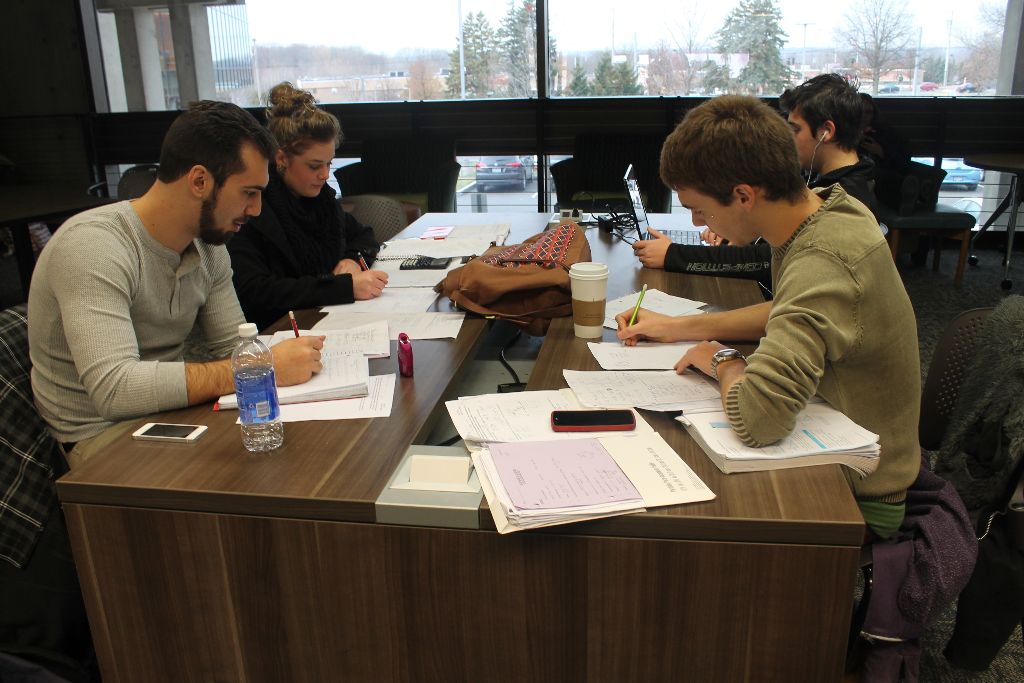Campus experts give advice for final exams
Staff Writer
Final exams are nearing for the students at Hudson Valley.
Donald Frament, learning strategies specialist at the Learning Assistance Center, suggested that students should make a table of contents of all the material covered in a particular course. Students should then create a study sheet, a list of “things you want to go over again … don’t put things you know.” Students should “translate into [their] own words” anything they don’t understand, perhaps a complicated definition or hard-to-grasp concept. Exams should be studied for in order, the first exam first and so on.
Students have many study resources: class notes, course syllabi, textbooks, and old tests. Frament explained that students can review tests that have not been returned to them if they visit their professor’s office hours.
“The way your brain works, it likes information organized and broken into chunks,” said Jessica Gilbert, college success specialist. She said students should prepare for finals by “creating a plan and obviously following that plan.”
“Cramming doesn’t work,” she said. However, if a student does have to resort to last-minute cramming, Gilbert said “work on knowing what you know very well” and avoid trying to learn anything new, because the brain will not be able to retain it.
Most people respond best to “active study”, Gilbert explained, which involves not only rereading material but repeating it aloud, rewriting it, and asking questions. “Get a partner if you’re an auditory learner” said Gilbert, saying that being able to explain concepts to a partner indicates the material is well-learned. “If you can’t say it, you probably don’t know it,” she added.
“Find a quiet place to study but not your bed […] when your brain thinks bed, your brain thinks sleep.” Gilbert added with a smile, “don’t keep your phone on or next to you,” because of the distraction of texting or social media.
She explained that some people study better with music, however, it has to be “music without words” particularly baroque classical music, which has been proven to enhance the brain’s ability to pay attention and improve memorization.
Students should “never study for more than forty-five or fifty minutes,” said Gilbert, and recommended leaving the room for ten to fifteen minute breaks. The human brain has an attention span of fifty minutes or less.
David Clickner, director of Learning Centers, the umbrella program for services such as the Learning Assistance Center and the Writing and Research Center, said that students should find time to relax, taking steps as simple as taking deep breaths and going for walks.
All these techniques prevent stress during finals week. Gilbert explained that when a person is stressed, their brain releases a hormone called cortisol, which affects information recall. It “fogs up your brain,” according to Gilbert. Increased levels of cortisol can also weaken the immune system, raising one’s chance of getting sick.
“Take care of yourself,” said Gilbert, and recommended getting enough sleep, drinking plenty of water, and eating healthily.
Frament said that it is important for students to know as much about an exam as possible, including what material it covers, how much it will impact their grade, and when and where it is.
Frament said that many students do not realize the school schedules changes during the week of finals. He said students need to be aware of their jobs, especially retail jobs, because finals week is also the week before Christmas, a busy time for retail workers.
In case a student encounters any problems during finals week, for instance by coming late to an exam or missing one, Frament stressed contacting professors immediately. “We don’t want students to fail,” Frament said.
Clickner says that students should “take the initiative to seek out faculty” in the weeks leading up to finals. “Too often students don’t take advantage of that,” he said.
There are several resources available to students if they need help, including the Learning Assistance Center in the Marvin Library, the Center for Academic Engagement, and Center for Access and Assistive Technology, both in the Siek Campus Center.

